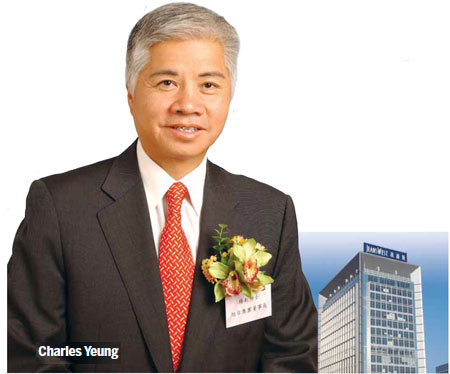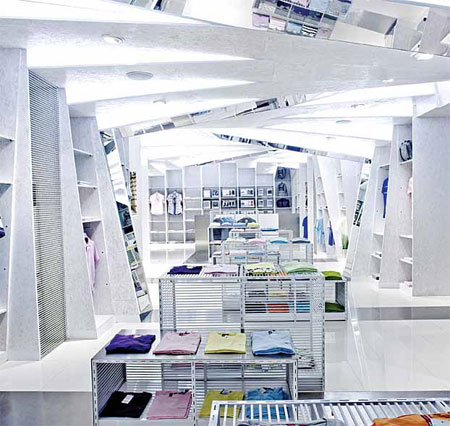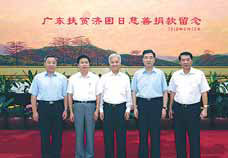Hail to the king
Updated: 2013-03-24 08:09
By Hao Nan(China Daily)
|
|||||||

|
Pictured here is one of the hundreds of Jeanswest stores worldwide. Photos Provided to China Daily |
|
Charles Yeung (center), chairman of Glorious Sun, contributes to charity activities through donations to the poor in Guangdong province. |
Behind the rise of Hong Kong's 'King of Pants'
For Charles Yeung, success in business is all about attitude.
Yeung, founder of Hong Kong-based company Glorious Sun Group, has built his career on taking a negative situation and turns it into an opportunity.
Born in 1947 in the city of Huizhou, Guangdong province, Yeung was 19 when college entrance exams were suspended nationwide due to China's "cultural revolution" (1966-76). Rather than being deterred by this setback, Yeung went to Hong Kong in search of work to support his large, impoverished family.
After a month spent struggling to find a job, Yeung began working in clothing factories, where he learned all about the business, manufacturing and management.
His effort and dedication soon set him apart from others, and Yeung was promoted from department leader to factory manager in short order.
An ambitious man, Yeung was not satisfied with promotion after promotion and decided to start his own business in 1974.
Right track for rapid growth
Yeung's business started from scratch.
The initial funding of the first Glorious Sun factory was only HK$100,000 ($12,890). Half of it came from Yeung's personal savings and the other half was borrowed from friends.
The company got off to a bumpy start. As a little-known startup, it was unable to get enough orders to maintain normal operation.
With the factory on the verge of shutting down, Yeung's fortune changed, and the company finally took off thanks to his acute business acumen.
At the time, a foreign clothing retailer was searching for a factory in Hong Kong to produce checkered jeans, but because of the time-consuming process required to make them, nearly all the quotations from other factories were beyond the retailer's budget.
Yeung then broke the deadlock with a much lower quote, allowing him to secure the big order.
Driven by a "can-do" spirit and with the help of a team of professional staff, Yeung and his colleagues completed a production line for checkered jeans that was capable of reducing costs while enhancing efficiency, he said.
The technologies also made Glorious Sun a new wonder in the local garment industry, he said.
Yeung earned his first fortune, about HK$6 million, from the order in two years, setting the stage for a business miracle.
Company expansion
Always keeping up with fashion and industry changes is a commercial creed that Yeung has inscribed in mind.
In the mid 70s, demand for jeans became much more diverse. Yeung seized the opportunity by adjusting to new trends and successfully managed to turn his small workshop into a big factory containing thousands of employees.
Yeung also won himself the nickname "King of Pants" as well as an award for being a promising young industrialist in Hong Kong.
In 1976, Yeung built on his momentum by expanding his business into international markets.
That year, the Glorious Sun Group opened its first overseas factory in the Philippines, which had cheaper land and labor than Hong Kong, he said.
By the early 1990s, the group had a series of branches and subsidiaries established around the world, and it was producing more than 20 million garments annually, with total turnover exceeding $400 million.
In addition to tapping overseas markets, Yeung is constantly seeking to improve product quality.
In the early 1990s, Glorious Sun Group became the first Chinese clothing manufacturer to win the ISO9002 international quality certification. By this time, it was well on its way to becoming one of the leading garment makers and exporters in the world.
In 1996, the group's listing on the Hong Kong Stock Exchange drew a record amount of investor subscriptions - nearly 236 times the amount of shares that were to be issued.
Brand construction
In 1990, the group purchased Jeanswest, an Australian retailer of casual clothing, marking the start of an aggressive campaign to build the company's brand.
Soon after, the brand was expanded to New Zealand and then throughout the Middle East.
Jeanswest now has more than 200 stores in Australia and New Zealand. It has become the second-largest brand in the two countries.
In 1993, Yeung set his sights on the Chinese mainland, and since then, he has seen surging business in China's big cities.
Shanghai was home to the first Jeanswest store on the mainland. There, its inexpensive yet fashionable clothing found a large market among the 18-to-25 age group.
After testing the waters and finding success, the group established a total of 65 new branches within a year in large cities and provinces across the country, including Beijing, Tianjin, Jiangsu and Hubei.
To date, Jeanswest has 110 companies directly under it all over the world, and it is expected to generate at least 10 billion yuan ($1.6 billion) in sales in Chinese markets by 2014.
Becoming mature
Once just a small factory for producing jeans, Glorious Sun Group now is an industrial giant operating in China, Vietnam, Singapore, the United States, Canada, Australia, New Zealand and the Middle East.
The group is expanding business into other areas as well, such as real estate and financial investment.
Running a business requires intelligence more than diligence and effort, Yeung said.
"People need to think and learn. Dare to fight but be good at it," he said.
"Nothing is absolute except for change, which can mean opportunity or danger, and what you do decides which it is."
Yeung said he values every staff member in his company and helps them to correctly find their role in the group.
"The Glorious Sun is more than a career. It is also a life, and the two combined can change work pressure into motivation. Others see the commercial world as a battlefield, but for us it is a playground," Yeung said.
After nearly four decades of development, the group is now recognized internationally for its success.
In 1997, Glorious Sun was chosen by the Dow Jones Industrial Average as one of Hong Kong's essential stocks.
In 1998, it became one of the 50 companies on the New Hang Seng Medium Enterprise Index. And, a year later the group was named as one of the world's 300 best small companies by Forbes magazine.
Charity, social responsibility
Despite these honors, Yeung remains quite modest and said he continues to strive for excellence.
"The label entrepreneur is a noble one that society has given me and I have to keep improving myself to live up to it," he noted.
He said his peace of mind comes from his belief in Buddhism, which he converted to in 1981. Since then, helping people has been a life-long goal.
He said he believes that if a person has enough material wealth, he or she should give something back to society. And able men should do more work.
Early in 1978, when most businessmen doubted the prospects of the reform and opening-up policy, Yeung invested in Chinese mainland without hesitation.
Over the years, his projects have covered more than 10 cities and provinces, providing jobs to about 15,000 people.
He also has taken part in charity activities, such as building schools, helping the disabled and the poor. He and the company have donated more than HK$1.5 billion in public services.
Thirty-seven Hope Schools have been established and every year, 1,000 college students from needy families get financial support from the Jeanswest College Education Fund, Yeung said.
haonan@chinadaily.com.cn
(China Daily 03/24/2013 page6)

